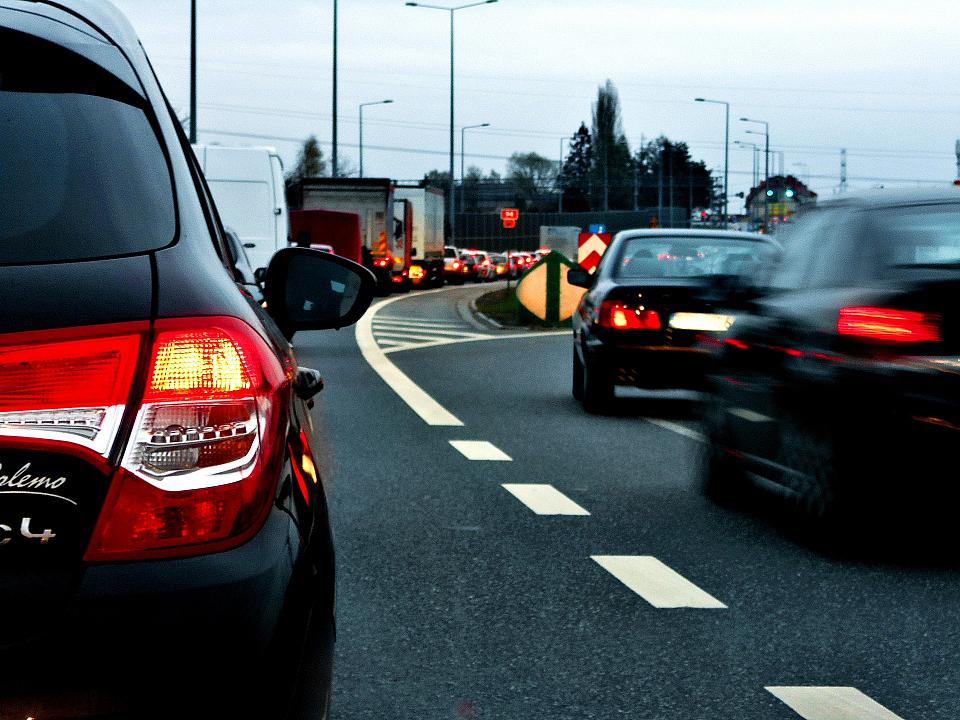This article was originally published in French on 11 May, 2016. Translator: Susanna Gendall.
The French are mad about diesel. 65 % of passenger vehicles run on the fuel, an unusually high figure. Second in line in Europe is Germany, far behind with about 45%. And in addition to the twenty million passenger vehicles on the French roads, is another five million commercial vehicles, and hundreds of thousands of trucks, most of which run on diesel. There’s also buses, the exhaust fumes of which leave a trail of coughing cyclists behind them (in many French cities cyclists and buses share the same lane). Because diesel is not good for your health, and we’ve known it for way too long.
In 1983, early in François Mitterrand’s first presidency, the “Roussel Report” came out, named after the medical professor that coordinated it. Commissioned by the Minister of the Environment Huguette Bouchardeau, the report highlights the risks of diesel particulate matter and diesel-related cancers. At the time, only 10% of vehicles ran on diesel. But it seems that Pierre Mauroy’s government had other concerns at the time. Public health was evidently not a priority.
78% of vehicles run on diesel in 2008
“By advocating nuclear energy, electric heating was developed on a massive scale. The French left their oil-fired boilers behind them and refineries were left with excess supplies, which they didn’t know what to do with,” explains economist Thomas Porcher. [1] So why not get rid of the surplus by selling more diesel cars? [2] Significant tax benefits went with the fuel, which had since the post-war years, been “reserved” for farmers and industrialists. Extending these benefits to passenger vehicles, as suggested by car makers still trying to recover from two oil shocks, was to be the development that would trigger a diesel frenzy. The technocrat Jacques Calvet, former principal private secretary to Valéry Giscard d’Estaing at the Ministry of Economy and Finance and head of PSA Peugeot-Citroën Group in 1982, played a key role in this strategic move.
This came as good news to the other French heavyweight Renault and the company followed in PSA Peugeot-Citroën’s footsteps. Midrange diesel vehicles, which were more expensive to buy, but cheaper to fill up, began to appear on French roads. “At the same time a planning policy was established, resulting in increased travel distances and increased use of private cars,” remarks France Nature Environnement (FNE), an umbrella organization for 3,000 environmental protection groups. “Diesel, cheaper for the consumer, becomes a booming market”. In 1990, 33% of France’s vehicle fleet run on diesel. In 2000, this figure jumps to 50%. And in 2008, it rockets to an astounding 78%!
Disastrous health effects
Meanwhile, there is mounting evidence of the harmful effects of diesel on human health, the fine particles in diesel exhaust causing damage to the respiratory system. “The particles are so fine that they get into the bronchial tubes and the respiratory system,” explains Florence Trébuchon, allergy and asthma specialist. [3] "This leads to inflammatory reactions, which can cause asthma or bronchitis and bronchiolitis.”
Although drivers may be the most at risk, cyclists, pedestrians and residents are also susceptible. People who live near major highways, such as those on the outskirts of Paris, are subject to ongoing extended exposure. On days when pollution is at its highest, emergency services are inundated with cases of asthma and bronchitis, particularly in children and the elderly.
“But the problem is not just limited to days of high pollution – far from it,’ maintains Florence Trébuchon. The World Health Organization (WHO), recommends that on average people be exposed to no more than 20 micrograms of PM10 (the most harmful particle) per cubic meter (μg/m3) of air per day. And exposure to levels of 50 μg/m3 should not be exceeded more than three days a year. Yet the standards are much looser in Europe: 40 μg/m3 per day, and exposure to 50 μg/m3 thirty-five days a year! “They’re greenlighting 40 μg/m3 even though the health effects are already very serious,” laments the scientist.
Particles that are less than 0.1 μm are called ultrafine particles and account for 1 to 20% of particles mass in the exhaust fumes of diesel engines and represent 50 to 90% of the total number of particles present in diesel exhaust fumes. The ultrafine particles can enter the lungs and the lining of blood vessels, getting into the blood and other areas of the body such as the cardiovascular system. [4]
“Our leaders can’t just act like they didn’t know.”
In France, we regularly go way over these limits, [5] to such an extent that France is now in dispute with the European Commission, which may take legal action against it for exceeding ultrafine particle emission limits. There are currently eleven French regions that are exceeding PM10 exposure limits. [6] These include the cities of Lille, Marseille, Paris, Lyon and Grenoble.
The exhaust fumes of diesel vehicles also attack the cardiovascular system and weaken the immune systems of children exposed in-utero. The black list is so black that some countries have opted to ban diesel from certain cities altogether, such as Milan, Hong Kong and Tokyo. But governments in France, irrespective of their political positioning, have all failed to address the issue of diesel. It seems that nobody – or almost nobody – is that interested. “In the nineties, the whole world was talking about the dangers of diesel,” recalls Thomas Porcher. “Our leaders can’t just act like they didn’t know. We reached a dramatic turning point over those years. And we just turned a blind eye as if nothing had happened. Obviously the car makers turned up right when their investments in researching and developing diesel began to be profitable.”
The “miracle” diesel particulate filter
So instead of giving up diesel, French car makers sought to make the fuel “clean”. In the late nineties, PSA Peugeot-Citroën invented the diesel particulate filter (DPF). Connected to the exhaust pipe, it is designed to trap particles, preventing them from getting into the air. The filter works so well that Guillaume Faury, director of research at Peugeot, maintains that “the air that comes out of the exhaust pipe is cleaner than the air it absorbs in the city.” [7].
Unfortunately, this is not quite accurate. The air emitted by a DPF-equipped vehicle contains large amounts of nitrogen dioxide (NO2), a gas that has a highly irritating effect on the nose, eyes and lungs, and which increases the risk of asthma in frail individuals. The team of journalists at Cash Investigation carried out tests which revealed that DPF-equipped vehicles emitted 1,700 micrograms of NO2 / m3, substantially more than the 200 μg/m3 declared by PSA!
Another issue with the diesel particulate filter is that it is more effective when driving at faster speeds and over longer distances. The short trips involved in driving around a city clog it up and may actually damage the engine. Many owners consequently choose to have it removed, a service, which despite being illegal, is offered by a number of professionals. It is especially tempting to take this route given the fact that its absence goes unnoticed at technical checks, as pollution tests don’t even check particulate emissions! The law doesn’t seem particularly bothered by these discrepancies even though DPFs were made mandatory for new engines as of January 2011. And nor do car makers, going so far as to sing the praises of their beloved filter even to the French Allergy Congress.
What happens when the big bosses call the ministers
Diesel lobbying groups are not short on connections. Their members, which include car makers, road haulage professionals, taxi companies and farmers, “regularly threaten to create problems for the country if any of diesel’s benefits are taken away,” remarks Thomas Porcher. In 1996, Corinne Lepage, then French Minister of the Environment under the Alain Juppé government, had to stand back and watch as her law on air quality had the guts taken out of it. [8] She still remembers the argument, even then, that it was important "not to make enemies!”
Dominique Voynet, who replaced her under Jospin’s government (1997-2001), recalls the abusive phone calls she received from the Peugeot director the minute she brought up diesel. [9] “Blackmail, using the argument of unemployment, has always been a key tactic used by carmaker lobby groups,” highlights Thomas Porcher. “And on the other side was a real lack of political courage. Diesel is at the centre of a genuine government scandal in France. Everyone knew, but no one did anything about it.”
What’s more, French leaders kept advocating diesel. Following the Grenelle Environment Forum in 2007, diesel vehicles got the “green” stamp of approval under the ecological incentive scheme that only factored in CO2 emissions, which are lower in diesel vehicles than those that run on petrol. At the time the public was still unaware that the actual emissions were in fact much higher than the amount declared by manufacturers.
“It’s as if everyone were going to die if we quit diesel”
In June 2012, WHO’s International Agency for Research on Cancer (IARC) declared the exhaust fumes from diesel engines “proven carcinogens". A respectful silence followed from the Ayrault government. A few months later, in March 2013, the Minister of “Industrial Renewal” claims to “have found an answer that doesn’t attack diesel, because attacking diesel is like attacking France!” “It’s as if everyone were going to die if we quit diesel,” Thomas Porcher says. “But it is up to the industry to find innovative answers and provide its employees with ongoing training. French car makers have the means to do this.”
In September 2015, the Volkswagen scandal involving diesel vehicles equipped with emissions-cheating software rekindled the debate on France’s favorite fuel. And the debate got even more heated when six months later, in January 2016, it was revealed that the emissions of a number of vehicles made by French brand Renault were over recommended levels. On 17 December 2015, the European Parliament voted to launch a Committee of Inquiry into the Volkswagen emissions scandal. It should establish the role played by European institutions, governments and carmakers in the scandal. Was Volkswagen the only company to use cheating devices? Was the European Commission aware of what was going on? Investigators will also look at the role played by national authorities responsible for registering new cars, to ensure their independence from the industry.
“We need to phase out diesel eventually,” maintains French Minister of Ecology Ségolène Royal [10], raising the possibility of making diesel the same price as petrol by 2020. The price difference between the fuels is currently 17 centimes per litre of fuel. The plan is that, through taxes, the price of petrol will be reduced by one centime each year while the price of diesel will increase by the same amount. Will this be enough of a disincentive?
Exemptions endorsing increased pollution
But when it comes to European emission standards aiming to limit the detrimental effects of diesel – voted almost ten years ago in 2007! – we still need to bide our time. On 3 February 2016, European MEPs endorsed a relaxation of emission test limits. The figures are significantly higher than recommended standards: + 110 % from September 2017 and + 50 % from January 2020 and thereafter. Ségolène Royal was pitted against the vote despite the fact that France was one of its main proponents. The European Commission was behind the decision, officially allowing diesel vehicles to exceed emission limits, based on a recommendation made by the “Technical Committee on Motor Vehicles”.
The committee, made up of two members from each country, follow their government’s orders…. “The French civil servants who authorised carmakers to exceed diesel emission limits did not give their own personal opinion. They merely did what they were told,” explains Corinne Lepage. “France is one of the countries that requested the opinion of a technical committee, which happens to hold sway over this issue, instead of asking the council of ministers so as not to get politicians involved in the decision!”
Diesel costs France at least 44 billion a year
Giving up diesel would at least free up some public finances, a sizeable amount of which has gone into diesel over the last thirty years. In addition to the amount that currently goes into tax benefits – to the tune of seven billion euros a year – is France’s trade imbalance, as France imports 40% of the diesel it consumes. This represents another eleven billion that could be saved, not to mention the astronomical health costs. A 2013 study by the Commission on Sustainable Development found that PM10 fine particle pollution costs each French person 672 euros per year, i.e., a total of 44 billion euros . . .
More recently, a Committee of Inquiry in the French Senate estimated that air pollution costs France more 100 billion euros each year, including 70 billion on health-related costs. Phasing out diesel is one of the main recommendations made by the Committee.
Civil society could also play a role by putting pressure on carmakers. Both activists of the organization Friends of the Earth France and French Green MEPs have filed several complaints for putting people’s lives in danger. To date, these complaints have been dismissed due to “inadequate evidence”. Despite the statistical evidence that pollution, and particularly diesel, is a health hazard, it is still difficult to establish a direct link between a given victim and emissions that exceed the authorized limit. The reality is that everyone pollutes, which means that no one in particular can be held legally liable. But some deem that the French government’s failure to protect its people from the hazards of diesel is so great that the complaints could be considered valid. Paris took a stand and decided to ban diesel vehicles registered before 1997 from the capital (as of July 2016), sparking anger from certain automobile associations . . . Maybe it’s a good time to remember that the right to breathe clean air is enshrined in the French law on air quality (1996) as well as indirectly in the constitutional Charter for the Environment.
Nolwenn Weiler




